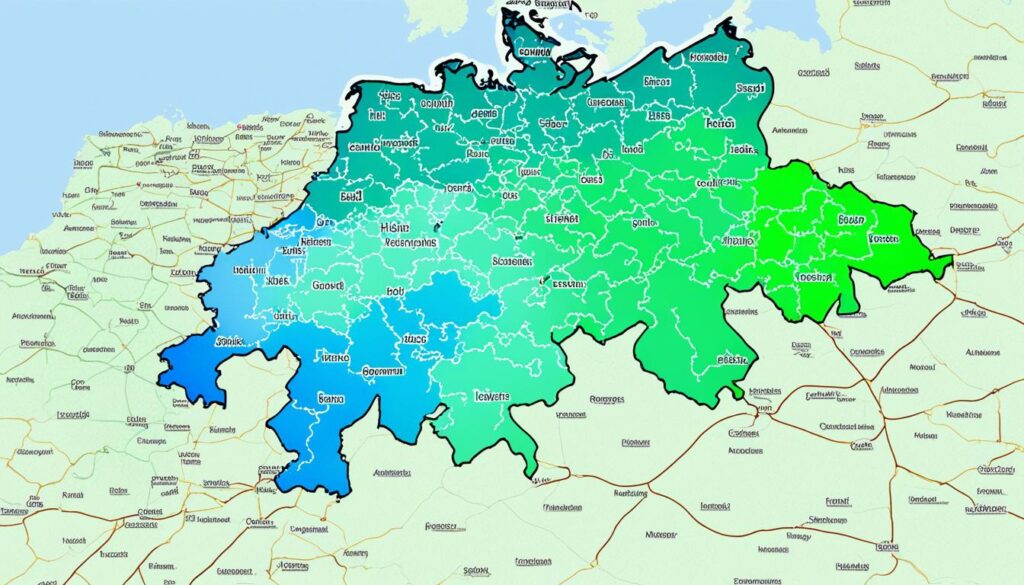The current landscape for average rent in Germany is ever-evolving, with 2025 revealing some noteworthy figures in the rental market. The average rent in Germany stands at approximately €957 per month for a one-bedroom apartment, reflecting significant variation by city. For instance, living in metropolitan areas like Munich and Berlin can set you back around €1,398 and €1,254 respectively, whereas more affordable options such as Aachen and Paderborn offer rents near €567. Understanding these rental prices in Germany is crucial for anyone contemplating a move, as it directly impacts budgeting and lifestyle choices. Additionally, it’s essential to take into account utility costs, averaging around €300, which contribute to the overall monthly expenses for those residing in Germany1.Explore more about the cost of living in.
Key Takeaways
- The average rent in Germany for a one-bedroom apartment is €957 per month.
- Rent prices vary significantly between cities, with Munich being the most expensive.
- Utility costs average around €300 per month, impacting total living costs.
- Aachen and Paderborn offer some of the most affordable rental options.
- Understanding local rental prices is essential for effective budgeting.
Contact us if you are Interested in Buying Property Abroad!
The Current State of the Rental Market in Germany
As of 2025, the current state of the rental market in Germany reflects notable dynamics, driven by economic shifts and a post-pandemic landscape. Recent rental market trends show that inflation has significantly impacted housing costs, with a general rate of around 6% over the past year. Major cities such as Munich and Berlin continue to lead the market, exhibiting higher rental prices that can be daunting for potential renters.
Recent Trends and Observations
The rental market in Germany is marked by a 12-month decline of 1.70% as of July 2025, though there was a slight uptick of 1.50% in the last three months. Within this context, there has been an approximate 6.60% increase in asking rents in Berlin, where prices for existing apartments range from 3,700 to 8,100 EUR/m² in desirable areas like Mitte and Mitte, Tiergarten2. Notably, average rent for new apartments in Charlottenburg surges to 11,000 EUR/m², indicating the lucrative but increasingly costly rental landscape that characterizes Berlin.
During the past years, approximately 28% fewer residential building permits were issued in the first eight months of 2023 compared to the previous year, signifying a slowdown that could affect future supply and demand3. Given this context, it is anticipated that demand for new apartments will surpass supply in the near term, further driving rent prices upward. Even more striking, average rents in Munich have soared by 21% compared to earlier indexes, showcasing significant pressure on tenants.
Average Rent in Germany

The landscape of average rent in Germany is diverse, reflecting significant regional differences and historical trends. Each city presents its unique rental rates, influenced largely by its popularity and demand.
Overview of Average Rent by City
Examining the current scene, cities such as Munich and Stuttgart maintain some of the highest average rent figures, with prices around €1,398 and €1,023 respectively. This is in sharp contrast to more affordable cities like Leipzig and Bremen, where average rents are much lower, recorded at €636 and €687 respectively. The average rent by city can vary considerably depending on factors like location, amenities, and housing type.
Comparison of 2025Rates to Previous Years
When looking at the trajectory of German rental rates over recent years, there’s a noticeable increase, particularly in major urban areas. As of 2025, the average rent for a one-bedroom apartment in city centers stands at approximately €915.94 with historical rental prices showing a consistent rise. Compared to previous rates, for instance, during pre-pandemic years, many metropolitan areas have seen their rents surge by as much as 15-20%, illustrating not just the resurgence post-COVID but a broader trend of increasing demand4. This shift makes it essential for new residents and those budgeting for accommodation to take these statistics into account. For more detailed insights into the living costs, including various expenses throughout the country, one might explore the breakdown of living expenses in5.
Regional Variations in Rental Prices

Understanding the regional rental prices in Germany helps to contextualize the housing challenges faced by many residents. In a country where the most expensive cities in Germany dominate the rental market, notable disparities exist between high-cost regions and more affordable cities.
Most Expensive Cities: Munich and Stuttgart
Munich continues to hold its position as the priciest city for renters, with average monthly rents soaring to about €1,398 for a one-bedroom apartment. Stuttgart closely follows with an average rent of €1,023, making it over 30% cheaper than Munich but still unaffordable for many households. These rising costs have led to a substantial strain on renters in these metropolitan areas, as their incomes struggle to keep pace with increasing rental prices6.
More Affordable Alternatives: Leipzig and Dresden
On the other hand, cities like Leipzig and Dresden present more affordable options without sacrificing quality of life. Rental prices in Leipzig can dip below €700, making it an attractive choice for families and students looking to reduce housing expenses. This shift towards affordable cities highlights a crucial need for balanced housing options across Germany, ensuring that all residents can find suitable living arrangements without facing financial hardship to alleviate the strain on households. The contrast between these regional rental prices underlines the necessity for improving rental markets nationwide7.
Cost of Living in Germany: Understanding Housing Costs
Exploring the cost of living in Germany reveals a comprehensive view of housing expenses that extend beyond mere rental prices. On average, an individual’s total monthly expenses, which include rent, utilities (around €374), groceries (about €230), and transportation (expenses averaging €49), adds up to approximately €1,904. For families, the cost significantly rises, with average monthly expenditures reaching about €4,289. These figures highlight how housing costs play a pivotal role in an individual’s or family’s financial planning.
Breakdown of Monthly Expenses for Individuals and Families
In cities like Berlin, the monthly rent for a one-bedroom apartment in the city center ranges from €900 to €1,200, while outside the center, it drops to between €700 and €9008. When considering all monthly expenses—including health insurance, which starts at around €200, and transportation costs estimated at roughly €84—a person might find a comfortable living budget in Berlin between €1,500 to €2,5008. This contrasts favorably with major metropolitan areas in Europe, making Germany an appealing option for many expatriates.
Comparison with Other European Countries
When assessing Germany’s cost of living against other European nations, it’s notable that Germany is generally more affordable, particularly in housing costs. For example, consumer prices in Munich are significantly lower than in cities like New York and Los Angeles, making it an attractive place for those looking to settle without exorbitant expenses9. Additionally, a one-bedroom apartment in Munich can range from USD$1,227 to $1,500 in the center, which shows how competitive the rental market is when compared to cities like Paris or London where rents typically soar higher. Therefore, individuals and families seeking to balance quality of life and affordability may find Germany a viable option in an ever-changing economic landscape for detailed insights on cost of living in.
Contact us if you are Interested in Buying Property Abroad!
FAQ
What is the average rent in Germany for a one-bedroom apartment?
Which cities in Germany have the highest rental prices?
How do rental prices in Germany compare to other European countries?
What are some affordable cities to live in Germany?
What other monthly expenses should I consider in Germany?
How much do utility costs average in Germany?
Have rental prices in Germany increased recently?
What factors influence rental prices in different German cities?
What is the average monthly cost of living for a family in Germany?
What are the primary areas of concern for new residents regarding costs?
Source Links
- https://housinganywhere.com/Germany/cost-of-living-germany
- https://guthmann.estate/en/market-report/berlin/
- https://www.savills.us/research_articles/256536/355076-0
- https://allaboutberlin.com/guides/cost-of-living
- https://www.numbeo.com/cost-of-living/country_result.jsp?country=Germany
- https://www.brookings.edu/articles/germany-rental-housing-markets/
- https://www.sciencedirect.com/science/article/abs/pii/S0166046215000022
- https://www.welcome-center-germany.com/post/expats-guide-navigating-the-cost-of-living-in-berlin
- https://www.internationalcitizens.com/living-abroad/costs/germany.php

Comments